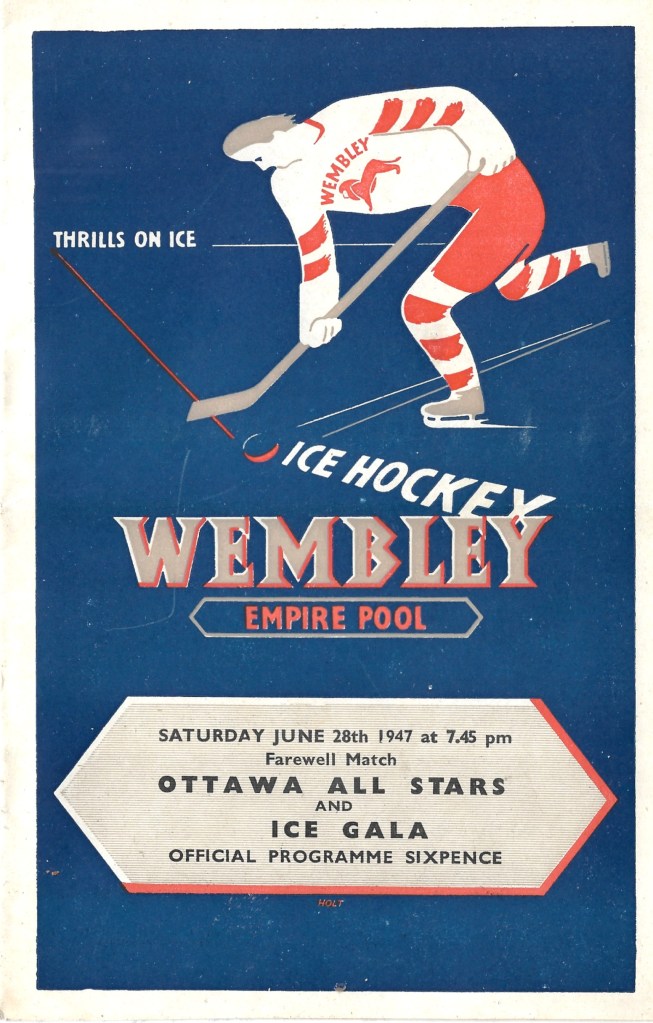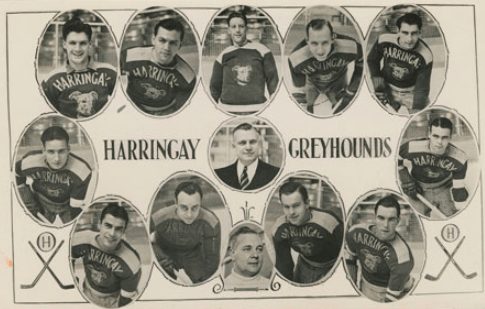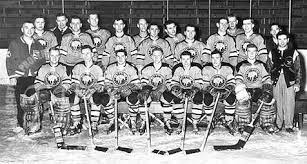On Saturday, 28 June 1947, the Ottawa All-Stars played the final game of their tour of the UK at Wembley Empire Pool, known better as Wembley Arena (currently OVO Arena Wembley).
The Ottawa All-Stars was a roster put together after the 1946-47 season, to head on tour in May & June.
They were the first hockey team to cross the Atlantic Ocean by air as they flew to England and back.
This fact was commented on by their Head Coach, Jack Wilkinson, in the official programme notes.
“All the boys have asked me to say that they were enormously pleased and proud to have been the first athletic organisation of any kind to fly the Atlantic and wish to pay a sincere tribute to Sir Arthur Elvin for his foresight and kindness in arranging our tour.”
As a side note, Arthur Elvin was the owner and operator of Wembley Stadium, credited with saving the stadium which went into liquidation at the end of the Exhibition (1925) after it was pronounced financially unviable.
It was an unusually short tour given a thirteen-game schedule (I can only find a record of nine of these games) in just under two months.
A few factors could have played into that. This roster was made up of a whole host of junior players (highly unusual) and others had jobs to return too back in Canada.
Despite the fine weather that year, crowds were keen for entertainment after the Second World War.

It’s been noted (unverified) that crowds were often 10,000 plus, albeit with the caveat that there was more entertainment than simply a hockey game.
For the final game of this tour for example there were two Ice Dancing shows before the teams took the ice.
Both intermissions featured ice dancing, pair and free skating and by all accounts some comedy sketches.
Public Skating was a feature at the Empire Pool with two sessions available on weekdays and three on both Saturday and Sunday.
The cost of Boots and Skates? 1/6.
That’s one shilling and sixpence for the uninitiated.
For many people attending, it may have been their first hockey game. As such, this handy diagram with rules was featured in the official programme.

Ottawa played various teams during their tour including Wembley (x2), Wembley Canadians, Canadians playing in England, English League All-Stars and Wembley Patrons’ Team.
They finished by playing a team simply named “The Rest.”
There was time for the All-Stars to travel around the UK and Europe so it’s entirely conceivable that they played opponents elsewhere in the UK and/or mainland Europe.
One such excursion was mentioned by Jack Wilkinson.
“Everyone we have met has been very nice to us, and we shall take some very pleasant memories back to Canada. One of the highlights of our visit was the day all the boys spent as guests of British Overseas Airways Corporation when they had a flip in the new B.O.A.C. 48-passenger flying boat at Hythe.”
The makeup of the Ottawa roster is intriguing, to say the least.
Given that this tour was 76 years ago, some information is incomplete or difficult to locate, whilst other tidbits lead down some interesting rabbit holes.
Goaltender
Harry Bennett
There is little to no information about the lone goaltender on the Ottawa roster.
He was, however, amongst five players from the Inkerman Rockets to represent the Ottawa All-Star team.
If that team name rings a bell, it does for a good reason. The Rockets were a junior team that began life as a bunch of farm boys. They went on to achieve monumental things in Canadian junior despite being based in a town with a population in the low three figures.
You can view their story below in this fantastic documentary.
Bennett was too old to play junior hockey upon his return to Canada so he and other overagers from the Rockets joined the Kemptville Royals. For three seasons the Royals dominated the St. Lawrence League and the O.D.H.A.St. Lawrence Senior League Champions
Defence
Frank Mathers
Mathers is easily the most recognisable name from this group. At the time of the tour, the 23-year-old was playing for the Ottawa Senators in the Quebec Senior Hockey League.
Mathers would sign in the AHL for the Pittsburgh Hornets and went on to feature in 23 games for the Toronto Maple Leafs. The defenceman would win four AHL championships in his career.
In 1956, Mathers moved on to the Hershey Bears in a joint player/coach role before becoming Head Coach in 1962.
The Winnipeg native remained in Hershey in the role of General Manager from 1973-1991 before retiring and ultimately taking on a team president position.
The American Hockey League honoured the Hershey legend with the naming of the Frank Mathers Trophy, presented to the team that finishes with the best regular season record in the Eastern Conference.
Jack Wilkinson
Jack Wilkinson’s real name was John and he played defense as well as coaching this team.
An Ottawa native, Wilkinson played for numerous teams in the province but he also had previous experience of playing in the UK. He suited up for the Wembley Canadians and Wembley Monarchs during the mid-1930s.
A forward during his playing career, Wilkinson played on nine occasions for the Boston Bruins in his final season (1943-44) before hanging up his skates.
Don Thompson
Thompson is the only player I could find nothing about regarding his career. He is one of the aforementioned five Inkerman Rocket representatives.
Joe Lepine
The 20-year-old defenceman hadn’t even played in a registered league before being chosen for this squad.
Lepine would sign for the Montreal Royals (QSHL) upon his return to Canada.
The following year, the Ontario native played three games in the AHL with Buffalo Bisons, scoring a solitary goal. A single season with the Cincinnati Mohawks (AHL) followed in 1949-50 in which Lepine scored ten goals, recorded thirty points and put up 169 penalty minutes.
Forwards
Eddie Slowinski
Perhaps the most decorated of this group in hockey terms, Slowinski came within a single goal of winning a Stanley Cup with the New York Rangers.
In 1950 New York led Detroit by three games to two but lost in overtime of game seven despite Slowinski leading all players in assists.
A right-winger, Slowinski featured in 291 games, recording 132 points (58G/74A).
The Manitoba native finished his career by playing five seasons in the American Hockey League, turning out on 274 occasions and producing 249 points (112G/137A). He was named to the AHL’s First All-Star Team in 1953-54 before retiring in 1958.
Ralph Hurley
A little more is known about Hurley because of a feature about the 20yo in the official game day programme.
The defenceman worked for the Canadian Pacific Railway company as an Assistant Stationmaster. He was given three months’ leave of absence to join the All-Star team and would return to his job after the tour.
He grew up in Inkerman and captained the Rockets from 1942-47, narrowly missing out on a championship in his final season.
After returning from Europe, Hurley helped form the Kemptville Royals and they won three ODHA championships in the St. Lawrence Senior League.
In 1950 he took a leave of absence from the CPR but surprisingly turned down an offer from the Buffalo Bisons (AHL). Instead, he headed back to Europe as many Canadians did at the same time, joining and captaining the Dundee Tigers in the Scottish Hockey League. This same year, he turned down an offer from the Buffalo Bisons of the American Hockey League to turn pro.
A second less successful stint in Scotland (1954-55) as captain of the Dunfermline Vikings meant a swift return home where he helped reorganise the Kemptville Royals for the 1955-56 season when the team took the league championship as well as the Citizen Shield. Following retirement from playing, Hurley turned his talents to coaching throughout Eastern Ontario.

Bill Watson
Better known as Billy, Watson was another youngster on the roast at the tender age of nineteen.
A centreman by trade, Watson played two seasons in the IHL with Fort Wayne Comets before heading to play for the iconic Cleveland Barons of the American Hockey League.
Watson finished his professional career with the Clinton Comets of the Eastern Hockey League, winning a championship in 1959.
For more information about the Comets, you can refer to these pair of articles.
https://www.echl.com/en/news/2018/9/pat-kelly-reflects-on-his-time-with-the-clinton-comets
https://eu.uticaod.com/story/sports/2018/11/25/clinton-comets-statue-honor/7948399007/
Jean Lafortune
Lafortune is not only mentioned and discussed in the Inkerman documentary but also features as an interviewee.
The right-winger returned to the UK in the second half of 1947, suiting up for Wembley and the Wembley Monarchs.
He would play another two full seasons in the British National League, recording 215 points (118G/97A) in 126 games for the Monarchs.

Joe Shack
Joe Shack was already familiar with the UK, having spent the three seasons preceding the Second World War with Harringay Greyhounds.
Upon returning to North America, the Manitoba native featured in 56 AHL games for New Haven Eagles.
In seventy games split across two seasons, Shack recorded 36 points in the NHL for New York Rangers.
By the time this tour came around, the Canadian was a veteran on the team at the age of thirty.
The left-handed shooter returned to the UK in 1948, once again teaming up with Harrangay, spending six seasons with the team and was captain for two of those.
Shack rounded off his career at the ill-fated Dunfermline Vikings, scoring four goals in five games.
Jake Brunning
There is very little information to be found on Brunning except that he played on the same Harringay team as his fellow Manitoba native, Joe Shack.
He produced 57 points (23G/34A) for the Greyhounds in the season that followed the tour but headed back to Canada the next year.
Records indicate he returned to the UK in 1952-53 but played just eight games for Harringay on this occasion.

The top line, second from the right is Jake Brunning.
The top line, first from the right is Joe Shack.
Lowell Craig
As a teenager, Craig was one of the very first out-of-town “imports” with the Inkerman Rockets.
After returning from Europe, the forward also known as “Odie” had a tryout for the New York Rangers which failed to pan out.
The remainder of his career was spent between the Kemptville Royals and Brockville Magedoma.
Craig later settled down in the Kemptville area and served as President of the Kemptville District Minor Hockey Association
Frank Turik
Turik played for his hometown Trail during his junior career and made the Memorial Cup finals in 1944, only being ousted by the powerful Oshawa Generals.
The following year, he was invited to play for the St. Michael’s College of Toronto Juniors, who went on to win the Memorial Cup. The forward was the tournament’s leading scorer with an incredible three hat tricks in five games.
After returning from the Ottawa All-Star tour, Turik had a trial with the Montreal Canadiens but would not receive an offer. A return to Trail resulted in playing for the Smoke Eaters for twelve years and Turik became the first player to attain 500 points.
Upon retirement from playing, Turik coached the Smoke Eaters and was Referee in Chief for the WIHL.

The final game of the tour for Ottawa certainly had its twists and turns, no doubt providing plenty of entertainment for the Wembley crowd.
The All-Stars led 4-1 through twenty minutes and 8-6 after two periods.
“The Rest” stormed back in the final frame, outscoring the visitors 6-1 to claim a remarkable 12-9 victory.
The scoresheet in the official programme was kindly filled in by person/s unnamed but the standouts were Watson (3G/3A) with six points and Shack with five points (1G/4A).

Harringay Greyhounds forward Wyn Cook helped himself to a hat-trick and seven points. He would move to Switzerland the following season. His Harrangay team-mate Ricky Ricard led the way with a four-goal game.
Rationing was still in place in 1947 and wouldn’t end on foodstuffs until 1954.
Wilkinson was keen to point out that the Ottawa All-Stars didn’t train on 60lbs of steak apiece during their tour.
“We were in fact about the only overseas travelling band of athletes who didn’t bring extra food. The boys were quite prepared to live on the same basis as everyone else.”
This is perhaps another reason why they were welcomed with open arms and then asked to come back to play in the UK during the following years.
If you have enjoyed this article and would like to support my work please consider donating https://ko-fi.com/markukleaf or PayPal.me/markukleaf
No donation is too small, even if it’s just the cost of a coffee. It would be much appreciated.
Alternatively, if you feel inclined to support me longer term please consider becoming a patron https://www.patreon.com/markukleaf
Thank you for considering the above, reading this article and for your continued support.
